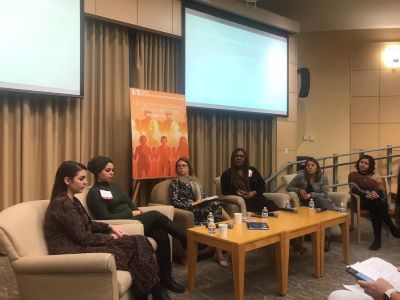
Anna Rivina and the Struggle against Domestic Violence in Russia
By Karl Afrikian, MALD 2022 Candidate, The Fletcher School
Domestic violence is a tragically rampant phenomenon in Russia, and the COVID-19 pandemic has more than doubled its prevalence. Anna Rivina is the head of Nasiliu.net (“No To Violence”), a leading women’s aid group in Russia that supports victims of domestic violence. She works to promote women’s rights and protect victims from abuse. Nasiliu.net, led by Russians and based in Moscow, gets most of its funding from individual donors. The non-profit provides psychological and legal support to women stuck in dangerous situations through a mobile application and a resource center.
However, Rivina has recently come under pressure from the Russian authorities. The Russian Federation Ministry of Justice has added Nasiliu.net to the dreaded “foreign agents” list. The harmful label imposed by this list restricts the ability of non-governmental organizations in Russia to enact their missions by subjecting them to short-notice audits, increased bureaucratic scrutiny, and public discrediting. Such practices are unfortunately part of a recent trend for Russian civil society organizations that are perceived to go against the mainstream definition of “traditional Russian values.” Many Russians do not consider domestic violence against women to be a significant concern, and its practice is heartrendingly commonplace in Russian society. The Russian Orthodox Church and other conservative groups in Russia find the fight against domestic violence and the promotion of gender equality to be “anti-family” in practice. They are thus able to marshal broad support in suppressing the work of women’s advocacy and aid groups.
Rivina spoke about the epidemic of domestic violence in Russia and the work of Nasiliu.net at The Fletcher School during the Conference on Gender and International Affairs on November 15, 2019. The theme of the conference was “[En]gendering Change: A Rally for Action” – something Rivina embodies in her work. On the Conference’s panel on “International Activism: Lessons from the Field,” Rivina highlighted her work and the challenges she faces while protecting the rights and well-being of women. She spoke alongside other activists from around the globe on pressing matters such as sexual health, domestic violence, and intersex rights. Rivina emphasized her efforts to overcome widespread social misunderstanding in Russia surrounding domestic violence: “The main problem in Russia is the lack of information, so we need to explain to people the border between violence and healthy relationships.”

With the most recent crisis facing Nasiliu.net receiving increased international attention, Rivina was featured on the cover of Time Magazine last month. The article notes that the Russian Federation has failed to pass over 40 draft laws focusing on domestic violence since the collapse of the Soviet Union in 1991 and that police reports of domestic violence often fall on indifferent ears. This inaction by the state has created an environment where abusers go unpunished, thus making abuse a common and tolerated practice. Despite the lack of legal protection for those struggling against domestic violence, Nasiliu.net has persisted in helping its clients, extending its crisis hotline to operate 24/7 and setting up a digital chat-bot for women who might be unable to speak on the phone safely and confidentially. The Time piece concludes on a dark note, noting that Rivina’s main goal is to convince Russia that organizations like hers are not enemies of the state, but instead that they are indeed the true protectors of the family, working to keep the domestic space free from violence.
Given the latest developments in Rivina’s career, the Fletcher Russia and Eurasia Program finds it fitting to remember Rivina’s panel at the Conference on Gender and International Affairs two years ago and to recognize her once again for her hard, courageous work aimed at assisting some of the most vulnerable women in Russia. Rivina’s story of fighting to protect women against the harsh reality of domestic violence is commendable, especially as rates of domestic violence have surged during the COVID-19 pandemic in Russia and throughout the world. While the continued operations of Nasiliu.net might be in jeopardy, it is undeniable that Rivina will her fight to protect Russia’s domestic violence victims against all odds.

This piece is republished from Gender and Intersectional Analysis at The Fletcher School.
